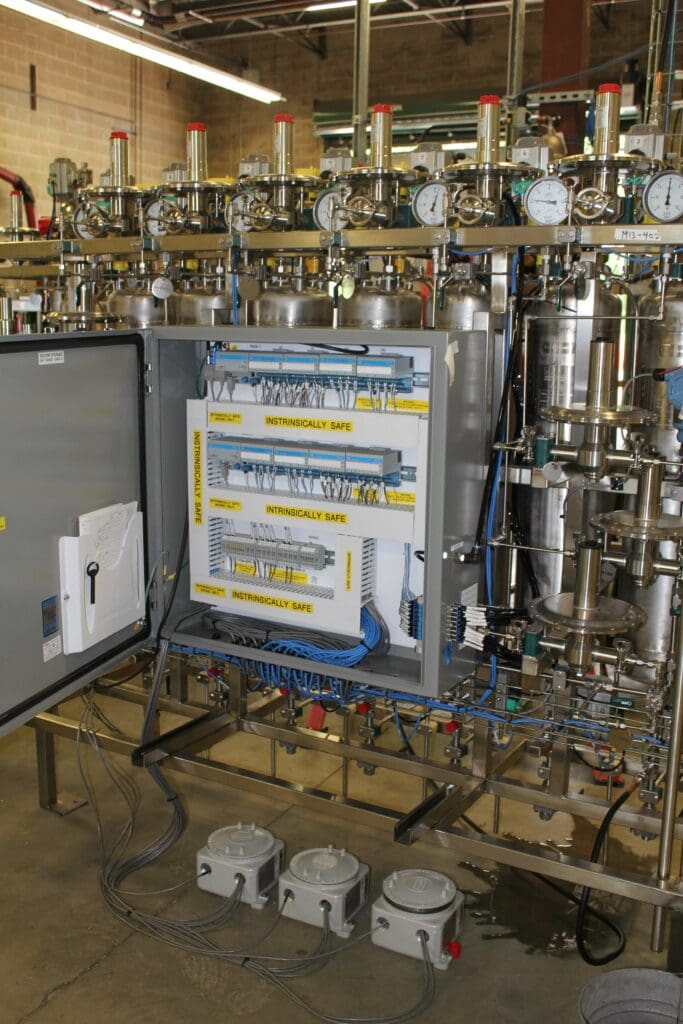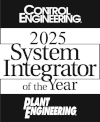
Custom Building Automation for Oligonucleotide/mRNA Process Facility
An mRNA therapeutics manufacturer needed a new process facility in order to meet growing demand. E Tech Group partnered with Hart Companies to deliver a complete automation system solution for the client.
The Project: Design & Build an Automated Process Facility for mRNA Therapeutics
With a large pipeline of products in development, a Massachusetts-based leader in the area of oligonucleotide/mRNA therapeutics needed a new process facility to achieve its business objectives. The Hart Companies and E Tech Group were selected to provide a complete solution to satisfy this need.
The project involved retrofitting portions of a multi-story, multi-tenant building that includes retail establishments and offices in addition to labs. The client chose a collaborative approach for this facility automation project, contracting both us and The Hart Companies to provide a comprehensive automation and control solution.
Hart Design Group Ltd. provided the engineering services, including process engineering and design, sequence-of-operations, component specifications, panel design, and detailed electrical design. E Tech Group provided the integrated controls solution. Hart’s construction arm, HEC Corp., delivered the process installation, including piping, instrumentation, pumps, and tankage. The delivery method was a true self-performed design-build program.
The Automation Solution: Coordinate Complex Processes Under One System

In general, the mRNA platform relies on solvent-based reagents to synthesize strands of nucleic acids. These in turn provide the pharmaco-active therapeutic activity that patients need. The handling of solvents in occupied spaces is highly regulated via building codes, driven by NFPA standards.
The building codes and standards are extremely specific and limit the quantity of flammable materials that can be stored on various floors – with dramatically less volumes allowed on higher floors. Hence, the control of solvent inventory calls for automated systems to deliver material “just in time” for manufacturing and to remove waste material. This helps keep inventories within limits in designated “control areas”.
The project involved integrating subsystems for buffer mixing/formulation and distribution; reagent distribution; and waste handling and storage. This included multiple tank rooms, piping for pumped and gravity supply of reagents to synthesizers, storage of intermediates and final product, and waste handling and storage.
The design was developed to maximize modularization, which allowed the skids to be fabricated off-site in Hart’s Cumberland, RI fabrication shop. These were then shipped and installed onsite, saving a significant amount of time on the construction schedule.
TA total of 22 custom control panels were designed and fabricated. These enclosed hardwired I/O including a total of 133 analog inputs, 800 digital inputs, and 400 digital outputs. Also, five VFDs communicated via ethernet for agitator control.
The Controls Solution: Get an Advanced Automation System to Communicate & Integrate
Integration challenges were numerous. In addition to the hard-wired I/O, BACnetTM communications were used between the PLC and the BMS for data exchange. ModbusTM communications were established between the PLC and the gas monitoring system furnished by Draeger for O2 and LEL. This included 150 ModbusTM tags providing percent O2 or LEL as well as alarm values. In addition, Festo CPX manifolds for valve actuation communicated over ethernet IP.
A software FAT was performed at E Tech Group’s Seabrook, NH location with the client’s participation.
The system architecture also included an HMI server, historian and SQL servers, redundant operator workstation servers, and an engineering workstation server. Arista client computers were employed.
The facility included a space with a Class I, Div. II, hazardous classification. Stahl 9470 series intrinsically safe I/O modules were used there. ControLogix 1756 series I/O was used for the non-hazardous areas.
Scheduling for start-up and site acceptance testing (SAT) was done in stages based on completion by area. This occasionally introduced periods of downtime. Hart and E Tech Group were well-prepared and able to respond to the changing timeline.
The Results: Another Successful Collaboration on Solvent Systems
Stemming from the number of prior solvent systems delivered together, the two companies followed the same guiding philosophy. Hart and E Tech Group’s approach was to build the system using known components and logic, introducing innovative components and subsystems where these provided a cost, efficiency, or reliability advantage.
Our companies’ close working relationship allowed Hart and E Tech Group to deliver a robust, flexible and fully functional system that satisfied the client’s demanding needs while assuring safety and complying with all stringent codes and standards.
The Hart Companies and E Tech Group duo are now working on their sixth solvent-based project together and plan to deliver similar successes for research and manufacturing clients well into the future.
Contact Us
"*" indicates required fields
